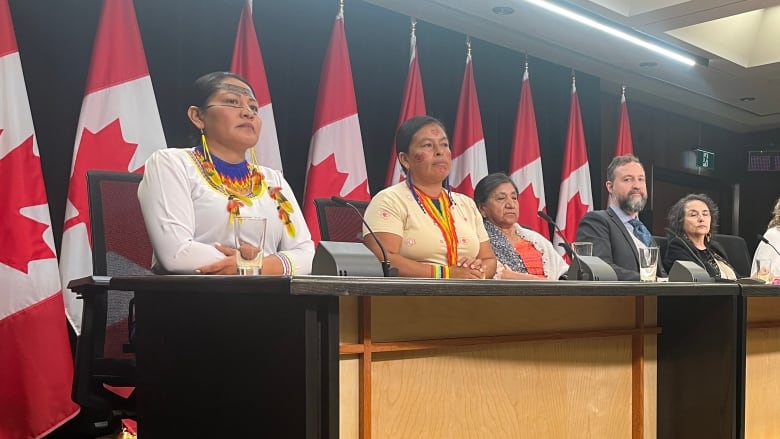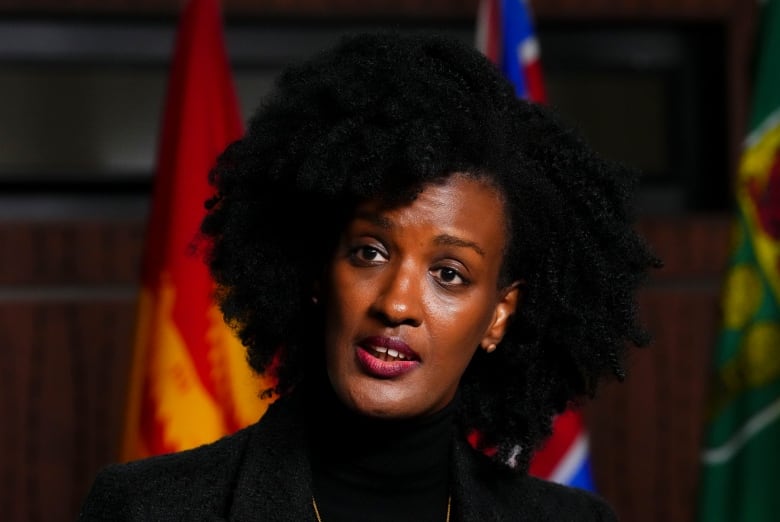Indigenous women from Ecuador bring concerns on mining abuses, free trade to Parliament Hill
Delegation to meet with federal leaders in Ottawa amid talks on proposed free trade deal

Indigenous women from Ecuadorarein Ottawa this weekraising concerns a proposed free trade agreement could enablehuman rights abuses by Canadian mining companies operating on their ancestrallands.
The delegationtravelled thousands of kilometres from the rural reaches of the Ecuadorian Amazon to Canada's capital city, bringing what they say is an urgent message of grave concern to the doorstep of Parliament Hill.
The Canadian government bills the potential deal as a progressive project to boost bilateral trade ties under the government's inclusive approach to advancemore opportunities for "underrepresented groups, such as women, Indigenous peoples" and others.
But at a news conference Wednesday, four women leaders from Ecuador argued Indigenous peoples in their country stand to gain the least and suffer the most from the proposed agreement.
Zenaida Yasacama, vice-president of the Confederation of Indigenous Nationalities of Ecuador, the country's largest Indigenous rights organization, said the expansion of Canadian mining activity on Indigenous lands has already led to deforestation and destruction of vital ecosystems.
Mining companies also have a "nefarious" impact on communities, Indigenouswomen in particular, added Yasacama, of the Kichwa Ancestral People of Pakayaku.
"They violate the human rights of Indigenous people, they violate the rights of nature and they violate our right to self govern," she said in Spanish, in response to a question from CBC Indigenous.
"In other words, the impacts translate into pollution. Our waters are polluted, our land is contaminated. We can no longer work on our land. In addition to this, women are threatened. They are judicialized. They are subjected to violence."
Trade Minister Mary Ng tabled Canada's objectives for the negotiations in the House of Commons in March 2024.
The Ecuadorian group wants Canada to not sign anything unless Indigenous peoples in Ecuador give their free, prior and informed consent, echoing a June 2024 recommendation from a House of Commons committee.
"We are deeply concerned about the way in which free trade negotiations between Ecuador and Canada are being carried out," said Yasacama.
Half of world's mining firms based in Canada
Global Affairs Canada didn't comment directly on that demand when asked. In a statement, a spokesperson said Ecuador is a key trading partner, with Canadian foreign direct investment totalling $4.4 billion in 2023, primarily in the mining and critical minerals sectors.
"Canada values independent and constructive perspectives and looks forward to meeting with the visiting delegation along with Canadian civil society groups," wrote Jean-Pierre J. Godbout.
"We remain a strong advocate for the full and effective participation of Indigenous peoples around the globe in international matters that affect them."
The delegation is set to meet with the parliamentary secretaries of foreign affairs and international trade on Thursday, an Amnesty International official told CBC Indigenous.
Amnesty co-organized the visit along with civil society groups like the Canadian Centre for Policy Alternatives, the Canadian Labour Congress and Mining Watch Canada.
Ketty Nivyabandi, secretary general of Amnesty International Canada's English-speaking section, said the realities Indigenous women leaders face in Ecuador are disturbing and can't be ignored.
"What you've heard from these women today also echoes and mirrors in many ways what we hear from Indigenous communities here in Canada," Nivyabandi said.

Nearly half of the globe's publicly listed mining and mineral exploration companies are headquartered in Canada, according to Natural Resources Canada. Some estimates put the number around 60 per cent.
There are 15 Canadian mining companies operating in Ecuador, with some facing allegations of abuses and working in ecologically sensitive areas, according to Mining Watch Canada.
At the news conference, Hortencia Zhagi, representative of the Board of Potable Water Administrators of Victoria del Portete and Tarqui, urged Canadians to reflect on their country's support for mining in Latin American countries.
"In no way does this benefit us," she said.
"On the contrary, it brings destruction, devastation and even death to our communities, especially to those of us who live in sensitive rural areas."
'Sacrifice zones'
Fanny Kaekat, leader of external affairsfor the Shuar Arutam People and member of Amazonian Women Defenders of the Forest, said Indigenous nations remain shut out of official decision making while their territories are turned into "sacrifice zones."
"We are already facing very great social and environmental impacts from mining," she said.
"We are being threatened and our territory is being expropriated. Speaking out here puts my safety at risk."
Some mining groups disputethat Canadian companies are responsible for human rights violations abroad.
The Mining Association of Canada, the industry's national voice since 1935, told a Commons committee in 2023 thatCanadian companies "tend to outperform their peers whose own governments turn a blind eye" to human rights.
The group was joined on stage by Bloc Qubcois MP Simon-Pierre Savard-Tremblay, who said Canada needs a real commission independent from political power that can receive complaints and conduct inquiries into abuse allegations.
Two NDP MPs proposed legislation in 2022 to give the Canadian Ombudsperson for Responsible Enterprise these powers, but the bill has not advanced past first reading.












_(720p).jpg)


 OFFICIAL HD MUSIC VIDEO.jpg)
.jpg)



























































































